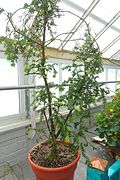
Cephalotaxus sp. Fossil, Photo: Michael Lahanas
Superregnum: Eukaryota
Regnum: Plantae
Divisio: Tracheophyta
Divisio: Pinophyta
Classis: Pinopsida
Ordo: Pinales
Familia: Taxaceae
Genus: Cephalotaxus
Species: C. alpina – C. fortunei - C. griffithii - C. hainanensis - C. harringtonia – C. nana – C. oliveri
Name
Cephalotaxus Siebold & Zucc. ex Endl., Gen. Pl., Suppl. 2: 27 (1842).
Typus: Cephalotaxus pedunculata Siebold & Zucc., Fl. Jap. Fam. Nat. 2: 108 (1846), a synonym of Cephalotaxus harringtonia (Knight ex J.Forbes) K.Koch, Dendrologie 2(2): 102 (1873).
References
Primary references
Endlicher, S.L. 1842. Mantissa botanica. Sistens Generum Plantarum Supplementum Secundum. 111 pp. Fr. Beck, Vindobonae. BHL Reference page.
Additional references
Lang, X.-D., Su, J.R., Lu, S.G. & Zhang, Z.J. 2013. A taxonomic revision of the genus Cephalotaxus (Taxaceae). Phytotaxa 84(1): 1–24. DOI: 10.11646/phytotaxa.84.1.1 Open access Reference page. (Incorrectly proposed that C. harringtonia be changed to C. harringtonii - see Govaerts et al., 2017.)
Links
Govaerts, R. et al. 2017. Cephalotaxus in World Checklist of Selected Plant Families. The Board of Trustees of the Royal Botanic Gardens, Kew. Published online. Accessed: 2017 Feb. 11. Reference page.
International Plant Names Index. 2017. Cephalotaxus. Published online. Accessed: Feb. 11 2017.
Tropicos.org 2017. Cephalotaxus. Missouri Botanical Garden. Published online. Accessed: 11 Feb. 2017.
Vernacular names
العربية: طقسوس برقوقي
dansk: Blommetaks
Deutsch: Kopfeiben
English: Plum-yew
فارسی: سرخدار آلو
suomi: Rypälekuuset
hornjoserbsce: Hłowoćis
magyar: Áltiszafa
한국어: 개비자나무속
македонски: Главотиса
norsk: Druetaksslekten
polski: Głowocis
中文: 三尖杉属
Cephalotaxus, commonly called plum yew or cowtail pine, is a genus of conifers comprising 11 species, treated in either the Cephalotaxaceae, or in the Taxaceae when that family is considered in a broad sense.[1][2] The genus is endemic to eastern Asia, though fossil evidence shows it had a wider Northern Hemisphere distribution in the past.[1] The species are evergreen shrubs and small trees reaching 1.0–10 metres (3–33 ft) (rarely to 20 metres (66 ft)) tall.
Taxonomy
Molecular studies place Cephalotaxus as the most basal member of the Taxaceae, having a very ancient divergence from them during the late Triassic.[3]
Description
The leaves are spirally arranged on the shoots, but twisted at the base to lie in two flat ranks (except on erect leading shoots); they are linear, 4–12 centimetres (1+1⁄2–4+3⁄4 in) long and 3–4 millimetres (1⁄8–5⁄32 in) broad, soft in texture, with a blunt tip; this helps distinguish them from the related genus Torreya, which has spine-tipped leaves.[2]
The species can be either monoecious or dioecious; when monoecious, the male and female cones are often on different branches. The male (pollen) cones are 5–8 millimetres (13⁄64–5⁄16 in) long, grouped in lines along the underside of a shoot. The female (seed) cones are single or grouped two to 15 together on short stems; minute at first, they mature in about 18 months to a drupe-like structure with the single large nut-like seed 1.5–4 centimetres (5⁄8–1+5⁄8 in) long surrounded by a fleshy covering, green to purple at full maturity. Natural dispersal is thought to be aided by squirrels which bury the seeds for a winter food source; any seeds left uneaten are then able to germinate.[2]
Phytochemistry
Cephalotaxus species produce cephalotaxine, an alkaloid. Parry et al 1980 provides evidence that cephalotaxine is a phenylethylisoquinoline. However, they also find this genus to be unable to incorporate cinnamic acid into cephalotaxine, and incorporation of cinnamic acid is usually a step in phenylethylisoquinoline syntheses, throwing the phenylethylisoquinoline theory in to question.[4]
Extant species
The taxonomy of Cephalotaxus is difficult, because the species have been defined using characteristics that intergrade with each other, such as the length and shape of needles, bark, and stomatal band color. Cephalotaxus species have often been separated geographically rather than morphologically.[5]
| Image | Scientific name | Common name | Distribution |
|---|---|---|---|
 |
Cephalotaxus fortunei | Chinese plum-yew | northern Burma and China |
 |
Cephalotaxus griffithii | Griffith's plum yew | northern India, northern Myanmar and the western Sichuan Province in China. |
| Cephalotaxus hainanensis | Hainan plum-yew | Hainan in southern China | |
 |
Cephalotaxus harringtonii | Japanese plum-yew, Harrington's cephalotaxus, or cowtail pine | from Kyūshū in the south to Hokkaidō, Japan |
 |
Cephalotaxus koreana | Korean plum yew | Korea, Japan and northeast China |
| Cephalotaxus lanceolata | Gongshan plum yew | northern Burma and southern China | |
| Cephalotaxus latifolia | Broad-leaved plum yew | southern China | |
 |
Cephalotaxus mannii | Mann's yew plum | southern China, northeast India, Laos, northern Thailand, northern Myanmar and northern Vietnam. |
 |
Cephalotaxus oliveri | Oliver's plum yew | China and possibly to Thailand, Laos, Vietnam and eastern India. |
 |
Cephalotaxus sinensis | Chinese plum yew | central and southern China. |
 |
Cephalotaxus wilsoniana | Taiwan plum yew, Taiwan cow's-tail pine, and Wilson plum yew | Taiwan |
References
Tripp, Kim E. (1995). "Cephalotaxus: the plum yews". Arnoldia. 55 (1): 25–39.
Christopher J. Earle (2011). "Cephalotaxus". The Gymnosperm Database. Archived from the original on 30 March 2012. Retrieved 31 March 2012.
Stull, Gregory W.; Qu, Xiao-Jian; Parins-Fukuchi, Caroline; Yang, Ying-Ying; Yang, Jun-Bo; Yang, Zhi-Yun; Hu, Yi; Ma, Hong; Soltis, Pamela S.; Soltis, Douglas E.; Li, De-Zhu (August 2021). "Gene duplications and phylogenomic conflict underlie major pulses of phenotypic evolution in gymnosperms". Nature Plants. 7 (8): 1015–1025. doi:10.1038/s41477-021-00964-4. ISSN 2055-0278.
Abdelkafi, Hajer; Nay, Bastien (2012-08-01). "Natural products from Cephalotaxus sp.: chemical diversity and synthetic aspects". Natural Product Reports. Royal Society of Chemistry (RSC). 29 (8): 845–869. doi:10.1039/C2NP20037F. ISSN 1460-4752.
Lang, XUE-Dong; Su, Jian-Rong; Lu, SHU-Gang; Zhang, ZHI-JUN (2013). "A taxonomic revision of the genus Cephalotaxus (Taxaceae)". Phytotaxa. 84. doi:10.11646/phytotaxa.84.1.1.
Retrieved from "http://en.wikipedia.org/"
All text is available under the terms of the GNU Free Documentation License

